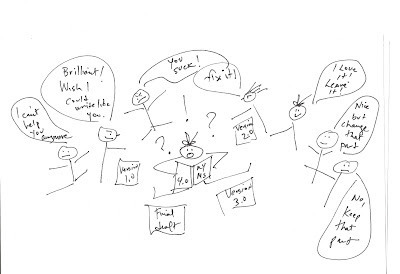Friday Feedback: Take Your Advice and . . . Think About It?
 So, a friend of mine -- a writer with several traditionally-published books under his belt -- asked if I would take a look at a YA manuscript of his (his first in the genre).
So, a friend of mine -- a writer with several traditionally-published books under his belt -- asked if I would take a look at a YA manuscript of his (his first in the genre). The manuscript has been getting great "plot" feedback from agents and editors alike, but they are, thereafter, rejecting it -- mostly on claimed issues with the story's "voice."
As such, he specifically asked me not to worry about little problems with story or structure or dialogue, but to just see if I could figure out what is wrong (if anything) with the voice.
So, here's the thing: I'm reading, knowing his credentials far exceed mine, and I'm seeing problems everywhere in the first 30 pages -- concrete problems that have nothing to do with voice (though might amount to why voice isn't working for them). And, so, I'm questioning myself.
"Who am I, compared to this more successful writer, compared to editors and agents alike, to think I might actually "see" more concrete things wrong with this manuscript?"
Worse, when I know that writing advice is subjective.
I like what I like, and I don't like what I don't like, and as objective as I try to be, that truth is going to seep in to any critique I offer.
Even professional reviewers can't avoid this truth, or how can one explain the same book getting a stellar Kirkus review, while the School Library Journal or VOYA review is, say, less so? (*coughs*). Doesn't it mean that those readings are subjective?
So, here's the million dollar question: when seeking feedback, Who do you believe?

What advice do you take?
IMHO, there are really no definitive answers, but I do have a rule of thumb. All well-intended, constructive criticism is, of course, food for thought . Sometimes, no more than that.
But, if two or more people I admire (writing or reading-wise) take issue with something in my manuscript (or, in the case of my agent or editor, it only needs to be that one person), I deem it more than food for thought. I deem it something that needs my focus and consideration.
I may not agree with how or why they've taken issue -- or their potential suggestion, if any, for how to fix it -- but I do believe that it means as the writer, I may not have done my job communicating what I was hoping to, as well as I thought I had.
I need to go back with fresh eyes and look at those parts again.
So, for example: In my current manuscript, one of the "bits" that plays out throughout the story happens to be a favorite part of several of my BETA readers. I got repeated positive feedback about those parts. My former agent loved them too.
So, imagine my surprise when my current (and forever) agent commented that he found those parts occasionally to be a bit "twee."
Twee?!
Blech.
My first thought was to ignore him -- I mean, it's like five against one, right?!
But as I thought more about it, and held sight of my rule -- I thought, maybe I just haven't done those parts quite as well as I thought I had. Maybe my BETA readers are forgiving, and my agent is rightfully not.
So, now, on revision, I will look again with fresh eyes and an open zen-like ( ;)) mind.

And, the best I can do for my friend, is offer up what I "see," how I feel when I read, and know he will take it for whatever it's worth.
But, here's the bottom line. I've said it before, and I'll say it again. WRITING IS SUBJECTIVE. Reading is too. Critiquing is too.
For as many readers (agents, editors, reviewers) as like your book, there will always be detractors, someone who doesn't. Some readers will connect with your book, and some just won't. It's personal, but it isn't. So, hold on to that. In the end it's your story. Your voice.
Only you can decide.
So, here we go, peeps. Just you and me and Friday Feedback. You know the RULES. Here's a bit from the manuscript I'm working on now. Just a rough bit from the early middle. The main character is a 17-yr old boy, and a very good artist.

"So, then. . .” She lifts my portfolio and rests it on the table. “I didn’t open it, but I really wanted to.” She laughs, apologetically. “It’s just that I hear that you’re good.”
I shift on the couch and press against the headache that’s forming at the bridge of my nose.“Ah, I see you’re not offering to help with my curiosity. Fair enough.” She winks to let me know she’s just playing, and slides the portfolio off to the side. There’s something real about it – her – how she’s honest, rather than therapist-like, which makes me feel badly that I’m not in the mood. She pulls her clipboard back onto her lap. “No worries, really, I’ll live. I promise. But, maybe Monday you’ll share?” She flips the sheet over and writes a note on it. The portfolio sits there, its handle dangling over the table’s edge.
My eyes flash to the small piece of masking tape wrapped around its handle, the words Kee ha Wo scrawled in Sarah’s handwriting. My stomach twists. I’d forgotten about that piece of tape. It’s mostly brown smudge now, my grip erasing letters over time . Kee ha Wo. It reads like some cryptic Chinese phrase. But I know what it said. I remember. It was a double entendre, the day of the MOMA, on the train. She had whispered it in my ear, and the next week, I found it taped there on the handle like that. She had burst out laughing when I found it, loud enough that Mrs. Tarantoli gave us a look from her desk.
Kee ha Woo. I remember every single word Sarah said.
- gae
p.s. if you missed Kate's Teachers Write! Quick Write yesterday, and you're a participant, you shouldn't have. You can find it, and chime in your letter here: http://www.katemessner.com/teachers-write-89-thursday-quick-write/
p.s.s. No sad goodbyes here from me to my Teachers Write! campers (I refuse!!). Friday Feedback isn't going anywhere just because summer may end. Come back and play any Friday, and your students are welcome too. xox
Published on August 09, 2012 20:10
No comments have been added yet.



